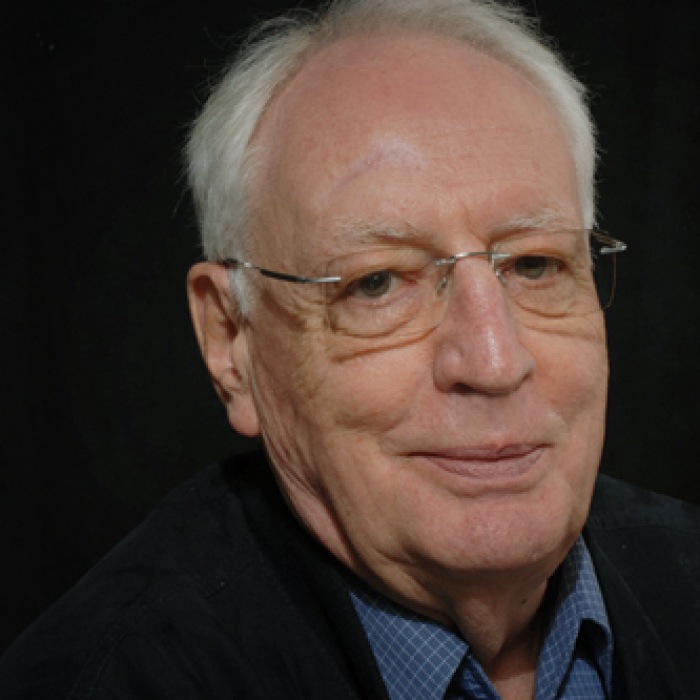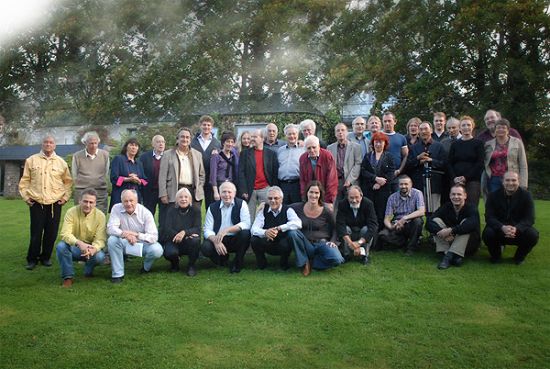A Gentle Revolutionary
Eulogy for Johannes Neumann

neumann_johannes_online_2011-revelinfrerk_8900x_0.jpg
Photo: Evelin Frerk
He fought for justice without any hint of self-righteousness, gave important impulses without taking himself seriously: On the evening of May 5, 2013, Johannes Neumann, former dean of the faculty of theology in Tübingen and later a critic of religion, died in the circle of his family after a long and serious illness. Michael Schmidt-Salomon commemorates a great enlightener and humanist.
Four years ago, at a meeting of the Giordano Bruno Stiftung, Evelin Frerk took a beautiful photo of Johannes Neumann standing in the middle of the picture, surrounded by numerous advisory board members and employees of the foundation. It is striking that Johannes - in contrast to everyone else - takes a stooped posture in in order not to obscure the view on the back rows.

This was, of course, because Johannes was a great man physically as well, who exceeded many. For me, however, this snapshot has something symbolic about it: Johannes often made himself smaller than he actually was. He would have never bragged about his own achievements or tried to outshine others. One of his remarkable features was that he was so free of any showmanship. In Johannes the greatest competence combined with the greatest modesty - and it was precisely this which made him one of the most pleasant, gentle, wisest, even, I would say, wisest people I have met in my life.
Albert Einstein once said: "The true value of a human being can be found in the degree to which he has attained liberation from the self." Even if the expression "true value of a human being" is unfortunate, Einstein's statement strikes a critical chord: for it is indeed the "degree to which" you can liberate yourself from the "self" that counts. Johannes Neumann was a wonderful role model in this respect. As much as he stood up for the self-determination rights of the individual and defended it decisively against attacks from the religious or political-ideological side, at the same time he had abandoned the illusion of the "grandiose self", which considers itself to be superior to the laws of nature. From this perspective also came the enormous tranquillity and serenity that John radiated in all his commitment to a more free and just society. His modesty was never artificial, but corresponded to the way he saw the world. Instead of presenting himself as "immensely important" (an attitude that can be observed in other religious critics), he concentrated on moving things forward that were and are genuinely important for human progress.
In this respect, the photo of the gbs meeting was anything but symbolic: Johannes Neumann was by no means a person who lived his life in a stooped posture. On the contrary: He was a prime example of upright walk! For good reason he was the first German professor of theology to return the ecclesiastical teaching position on his own initiative. Because he was able to switch from theology to sociology, this step was not associated with any serious economic disadvantages, but it marked an important turning point in his life. After all, as a theologian he had pursued quite a picture-book career: born in Königsberg in 1929, Johannes had studied philosophy, history, sociology, and theology in Freiburg and Munich. After his PhD and habilitation in Munich, he was appointed Professor of Canon Law at the renowned theological faculty of the University of Tübingen, where he taught alongside Hans Küng and Joseph Ratzinger.
His relationship to the later Pope was highly ambivalent. On the one hand Johannes took him to countless concerts and events with his car out of collegiality, on the other hand he was his fiercest adversary within the faculty. Ratzinger did not hide this and described his colleague as a "wolf in sheep's clothing". The conflicts between the two intensified when Johannes gave up his post as dean of the faculty of theology and Ratzinger took over. The despotic leadership style of the Bavarian even led Johannes to leave a faculty meeting prematurely, slamming the door shut - anyone who knew Johannes knows how difficult it must have been to induce him to such a reaction.
After Ratzinger had left Tübingen for Regensburg, some peace returned. Johannes, whose faith certainties now dwindled more and more, increasingly turned to administrative tasks. From 1970 to 1972 he took over the post of principal of the University of Tübingen. In his subsequent theological lectures and seminars, he was increasingly confronted with questions that he could not answer according to the church ministry, so that he was summoned by the responsible bishop, who asked him in a reproachful tone why he needed to spread out everything he knew in front of students and lay people.
While some accused Johannes of going too far with his church criticism, for others he did not go far enough. The latter was also expressed by his assistant at the time, who first learned to appreciate Johannes and then to love him - an incident that gave his life a whole new turn. After leaving theology in 1977 and marrying Ursula Neumann, Johannes increasingly turned to questions critical of religion in addition to his commitment to disabled people (for example, he founded the "Zentrum zur interdisziplinären Erforschung der Lebenswelten Behinderter Menschen" - "Centre for Interdisciplinary Research on the Living Environments of Disabled People"). He wrote substantial and still influential works on the separation of state and church, became a member of the Humanistische Union and the Humanistische Akademie Berlin, an advisor to the International League of Non-Religious and Atheists (IBKA) and co-editor of the journal "Aufklärung und Kritik".
The first time I met Johannes personally was at a meeting of the "International Erich Fromm Society", which he co-founded and presided for a while as first chairman. However, it was not until a few years later, in October 2000, when Johannes and Ursula Neumann were awarded the Erwin Fischer Prize of the IBKA, that we had a more in-depth discussion. This award was not only intended to honour the outstanding theoretical contributions made by the Neumann couple. One of the reasons for the award was the legal dispute that Ursula and Johannes Neumann had filed against ethics education in Baden-Württemberg and fought all the way to the last instance, a dispute that is still cited today. In the margins of this award ceremony, we discussed the idea of setting up a "Giordano Bruno Fund for the Victims of Religious Violence". At that time we lacked the means to set up such a fund, but the idea of combining a new secular project with the name "Giordano Bruno" remained in our minds.
Three years later Johannes, wrote me a long letter, congratulating me on a recent essay on "evolutionary humanism". Johannes said that something could be built on the concept of evolutionary humanism, since we should not stop at mere criticism of religion, but should develop alternatives to the religious models of world interpretation. As luck would have it, a few days later Carsten Frerk came to visit me and I discussed Johannes' proposal with him. This probably wouldn't have had any far-reaching consequences if Carsten hadn't brought another guest with him, whom I only knew from a distance as a supporter of Karlheinz Deschner: Herbert Steffen. During the conversation, however, an idea matured in Herbert that ultimately led to the establishment of the "Giordano Bruno Stiftung zur Förderung des evolutionären Humanismus" ("Giordano Bruno Foundation for the Promotion of Evolutionary Humanism"). Without knowing it, Johannes had thus become a co-initiator of the gbs. Of course he also agreed immediately when we asked him if he would support the foundation as an advisory board member.
In the following years, we benefited greatly from his knowledge and foresight. As long as his health allowed it, he was present at every foundation meeting. I remember him saying at one of these meetings that the Giordano Bruno Stiftung had finally created "a home for our ideas". For us, this "home" was inseparably linked to his name. That's why his loss hurts so much.
Bertolt Brecht lamented in his great prose poem "To Those Who Follow in Our Wake": "Even the hatred of squalor / Distorts one’s features. / Even anger against injustice / Makes the voice grow hoarse. Oh we / Who wished to lay the foundation for gentleness / Could not ourselves be gentle." But Johannes could! He was a gentle revolutionary who remained friendly, even if he was outraged by injustice. We are going to miss him.
